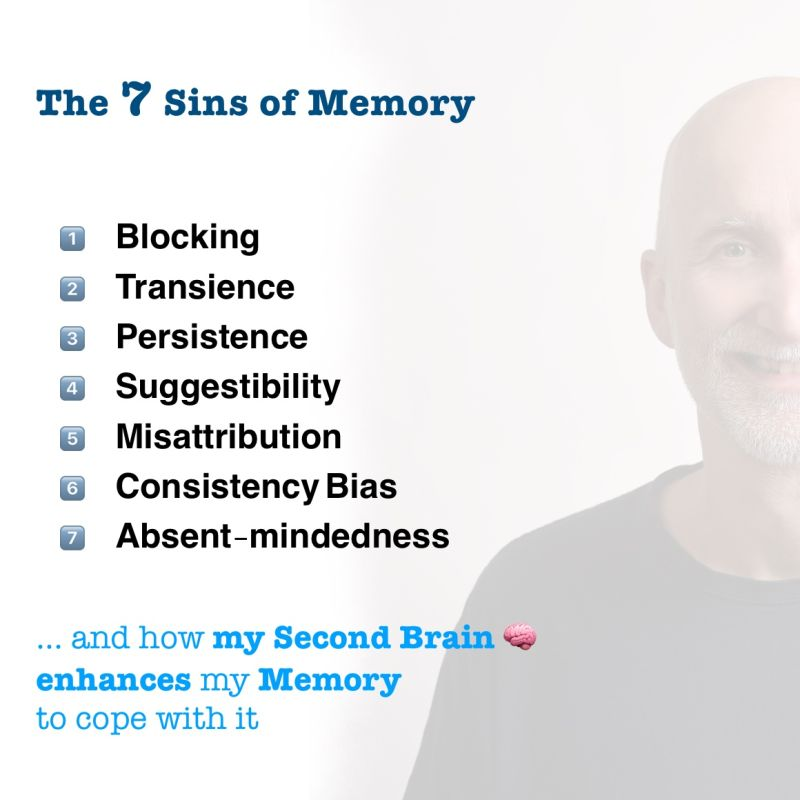7 sins of Memory
LinkedIn Post

The 7 Sins of Memory
(How my Second Brain enhances my Memory)
Memory is a tricky thing.
Daniel L. Schacter’s 📖 “The Seven Sins of Memory” highlights how our brains can lead us astray.
But what if we could counter these with a Second Brain?
Some ideas:
to Adress Failures to Recall
———
1️⃣ Transience: The decreasing accessibility of memory over time.
🧠 Retain through notes: Capture ideas and link them in your journal.
🧠 Spaced repetition: Implement spaced repetition systems in your Second Brain.
2️⃣ Absent-mindedness: Lapses of attention that result in forgetting, often due to distractions.
🧠 Task management tools: Use Todoist to stay on track.
🧠 Routine checklists: Create daily checklists for important tasks.
3️⃣ Blocking: The temporary inability to retrieve a memory.
🧠 Create associations: Take notes about people to remember names better.
🧠 Mindmaps: Use tools like Excalidraw to visualize connections.
to work with Distorted or Unwanted Memories
———
4️⃣ Misattribution: Assigning a memory to the wrong source.
🧠 Journaling: Connect events with context to re-access information.
🧠 Source attribution: Always note where information comes from.
5️⃣ Suggestibility: Incorporating misinformation due to leading questions or other influences.
🧠 Reflect and verify: Take time to reflect on and verify information.
🧠 Critical thinking prompts: Use Socratic questions to challenge your thoughts.
🧠 Diverse perspectives: Seek and document multiple viewpoints.
6️⃣ Consistency Bias: The distorting influence of current beliefs on past memories.
🧠 Reflect on core beliefs: Regularly revisit and document your beliefs. Your Second Brain can help you access previous thought patterns even with new information.
7️⃣ Persistence: The unwanted recurrence of distressing memories.
🧠 Emotional brainwriting: Process your thoughts through brainwriting
(check out my post on this: Unleashing Creativity with Brainwriting - https://lnkd.in/euytZJvg).
With your Second Brain you can enhance your recall, reduce errors, and manage unwanted thoughts.
Ready to build your Second Brain? Need a starting point? Let’s connect!
Content preparation
Belief: Our mind is for having ideas, not for storing them 📖 The Seven Sins of Memory
Sins of Omission (Failures to Recall) → Transience: The decreasing accessibility of memory over time. 🧠 Retain through notes and connecting notes with each other and a journal 🧠 Implement spaced repetition systems within your Second Brain
→ Absent-mindedness: Lapses of attention that result in forgetting. Occurs when we are distracted or not paying close attention to the task at hand 🧠 Utilize task management tools like Todoist 🧠 Routine Checklists: Create checklists for daily routines and important tasks
→ Blocking: The temporary inability to retrieve a memory. 🧠 Create more associations for information susceptible to blocking. Eg. take a note about a person to remember their names better. 🧠 Create Mindmaps e.g. with Excalidraw
Sins of Commission (Distorted or Unwanted Memories) → Misattribution: Assigning a memory to the wrong source. This includes errors such as remembering something that happened to someone else as happening to you or confusing the context in which a memory occurred. 🧠 Through journalling and connecting with events and context one can easily re-access information 🧠 Source Attribution: Always note the source of information
→ Suggestibility: The incorporation of misinformation into memory due to leading questions, deception, or other influences. 🧠 Take time to reflect on information. Check the sources. Zoom out and reflect. 🧠 Critical Thinking Prompts: Use prompts and questions - e.g. with Socratic questions 🧠 Diverse Perspectives: Actively seek out and document multiple perspectives
→ Bias: The distorting influences of present knowledge, beliefs, and feelings on the recollection of previous experiences. This can cause memories to be reshaped in light of current beliefs and attitudes. 🧠 I regularly reflect on my core beliefs. My Second Brain represents a snapshot of knowledge. And with new information I can still access my previous way to think about it.
→ Persistence: The unwanted recurrence of memories, often disturbing or traumatic ones, that we would prefer to forget. 🧠 I work with emotional brainwriting and processing my thoughts (see https://www.linkedin.com/posts/sebastiankamilli_unleashing-creativity-with-brainwriting-activity-7167080721528913920-q_GV?utm_source=share&utm_medium=member_desktop)
📖 The Seven Sins of Memory by Daniel L. Schacter
–
- Memories are transient – many memories disappear over time without us realizing it
- memory tricks called mnemonics, which work by linking new information to places or numbers
- associate new information to concepts and images that are already meaningful to you
- absent-mindedness is an entirely different kind of memory failure
- Absent-mindedness means you’re not paying enough attention to the task at hand, so incoming information is either partially encoded or not at all.
- set up an appropriate cue that both informs and is available.
- Putting your medication by your toothbrush is a perfect example of an appropriate cue
- you do know the answer – the only issue is that it’s being blocked
- make more associations for information susceptible to blocking
- Misattribute things we’ve seen in different situations
- If information is not firmly linked to a time or place, it gets mixed up with other loose memories.
- we are highly suggestible when it comes to remembering past events
- Being asked leading questions about past memories can actually change what we remember
- consistency bias
- you’re likely to believe your views are the same now as they were in the past.
- memory persistence
- Persistent memories are the result of events that have a big emotional impact
- talking or writing about persistent memories, which puts stressful experiences into a narrative context, helps us cope with them. Positive effects also include improved mood and a boosted immune system.
Forgetting curve by Ebbinghaus
Hook:
One person:
One Problem:
One Solution:
One Story:
One CTA:
Posted on LINKEDIN on 2024-06-10_Mon